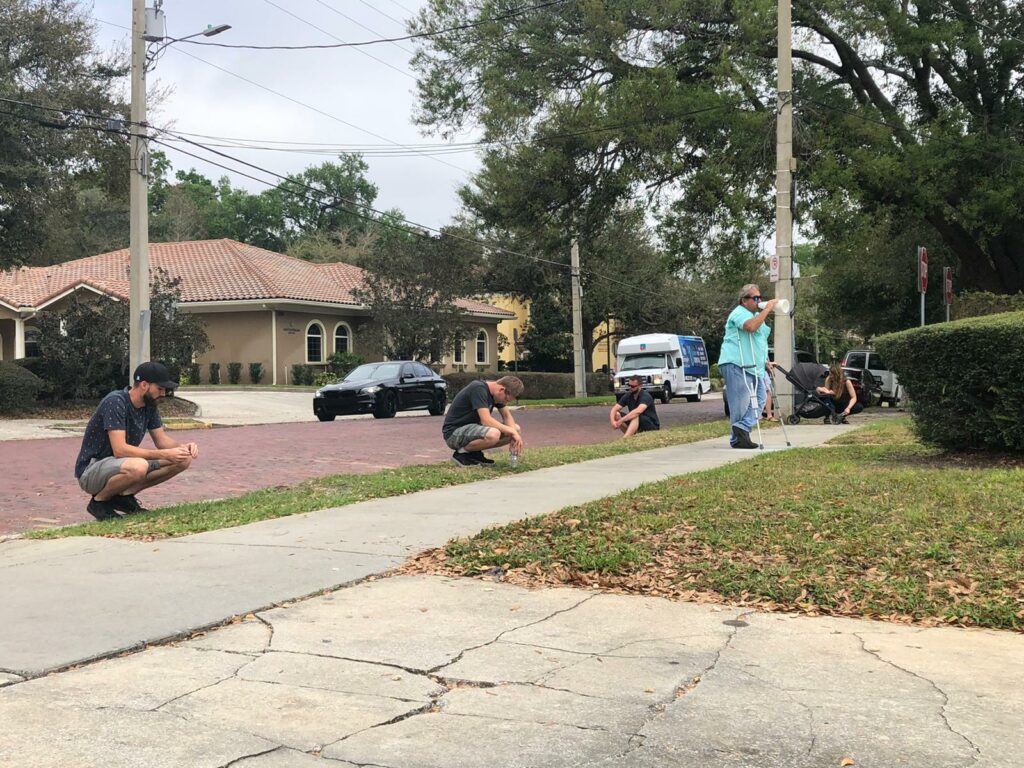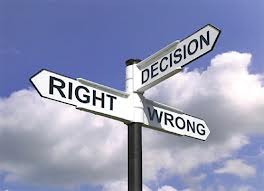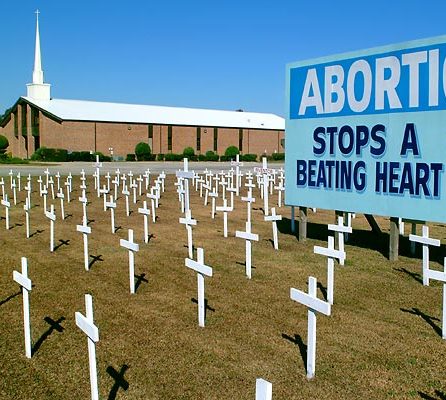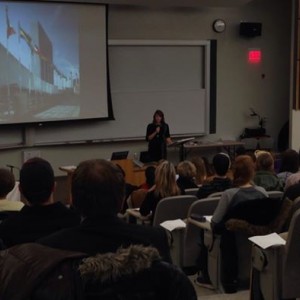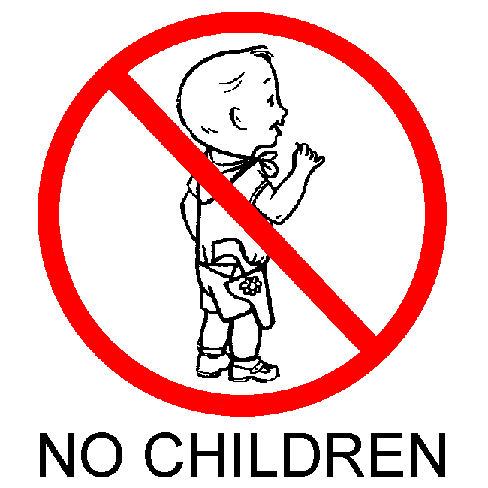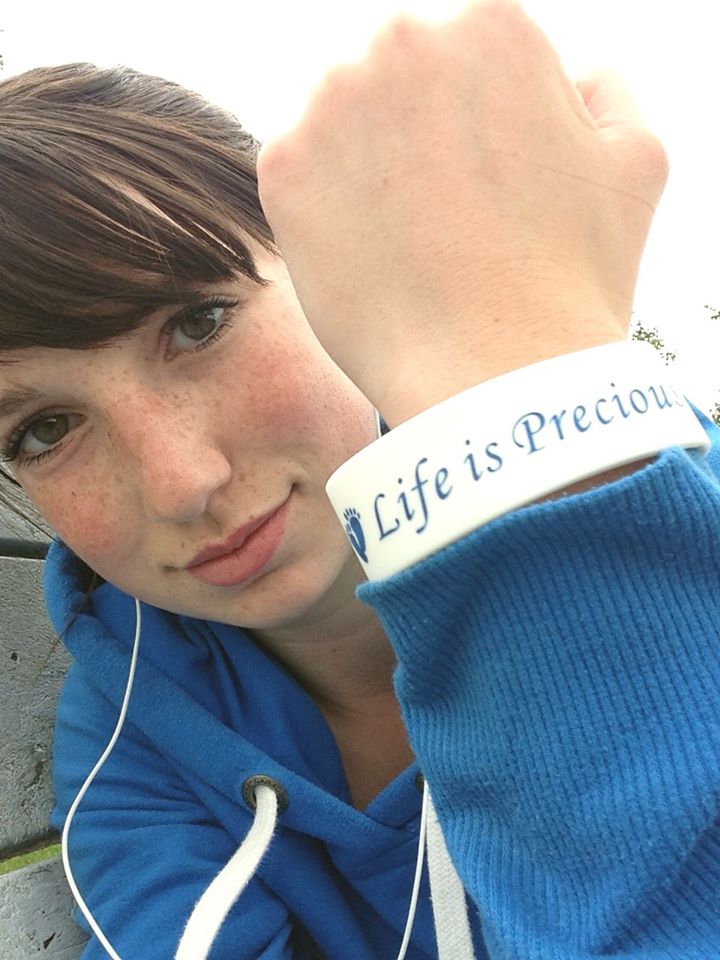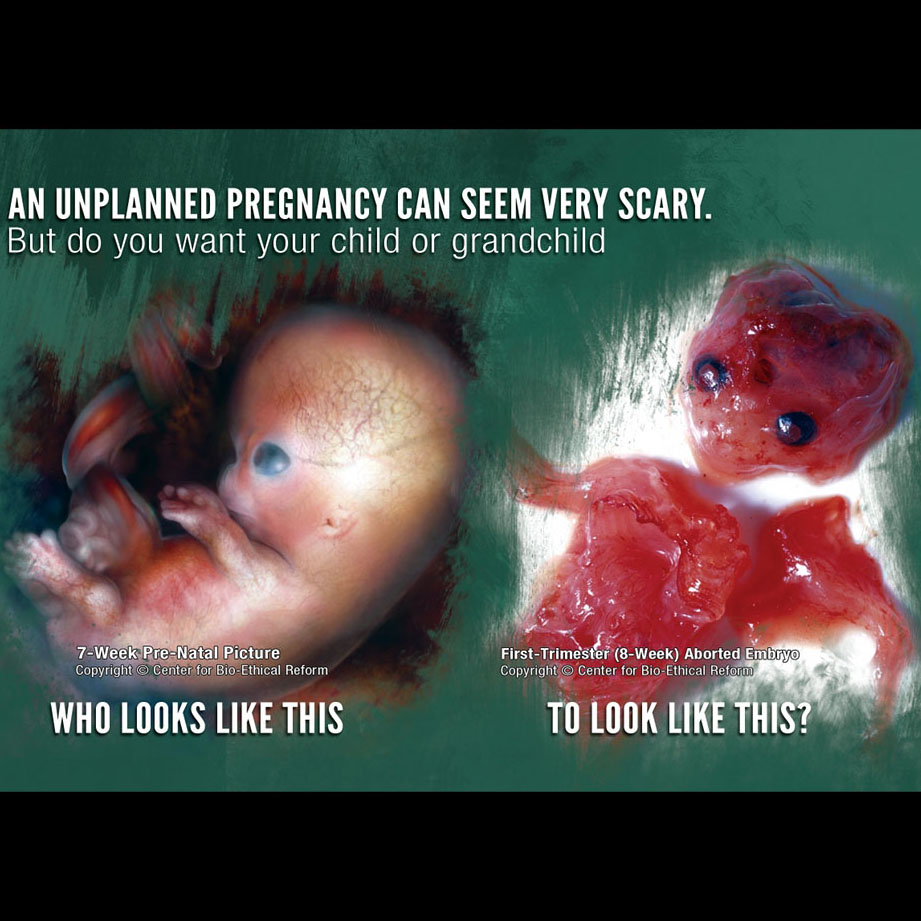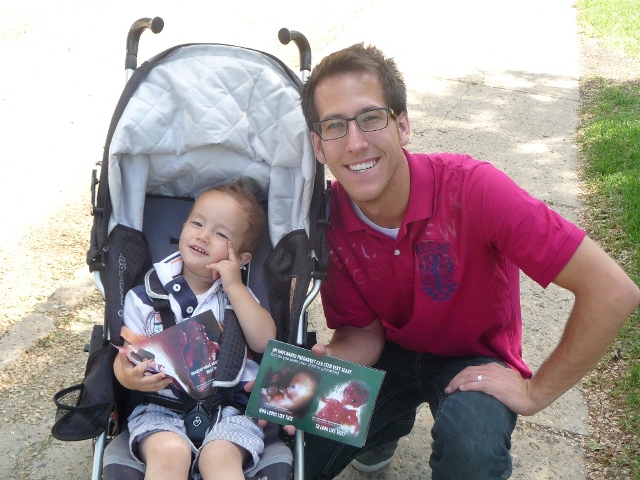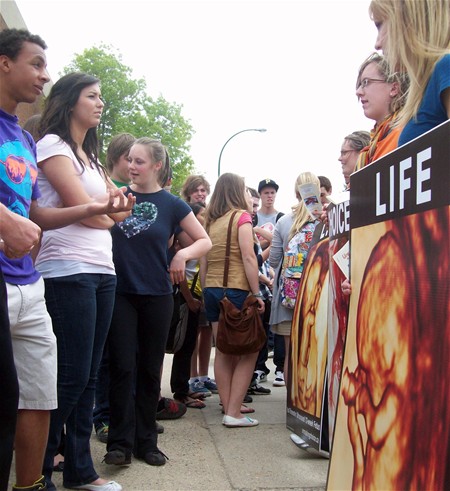TIME TO LOCK UP YOUR WIVES AND DAUGHTERS?
If we were living in the 1970s, such a headline might well be heeded. But the throngs of youthful sign-wielding, slogan-chanting demonstrators on Parliament Hill every spring have a radically different purpose: rather than demanding reproductive rights for themselves, they are advocates for the sanctity of life and protection of the pre-born. And across the country, every week, more volunteers brave spiteful epithets, occasional projectiles, and inclement weather while holding signs depicting graphic images of aborted babies. Unfortunately, these “Choice” Chain volunteers sometimes face opposition from unexpected fronts. Young women in particular are targeted, not only by angry passers-by, but by members of their own Reformed churches. “Choice” Chain has drawn criticism because the majority of volunteers are female. At other times young mothers have been chastised for neglecting their children and housewifely duties while engaging in this pro-life work, and admonished to set a better example of biblical womanhood for their daughters. And so I approach this age-old question with some reluctance and trepidation: what is a woman to do? What is her biblical role and, more specifically, does it include pro-life activism such as “Choice” Chain?
Most often negative responses to this question accompany objections, whether tacit or spoken, of this nature:
1. A woman’s place is in the home, not on the streets.
2. Women who take public leadership roles upset the divine ordinance of creation.
3. Women who spend so much time pursuing these efforts are not being good mothers.
4. Public activism is simply not womanly and violates Biblical standards of femininity.
I will attempt to address these claims in the above order.
The first of these objections evokes the image of the woman in Proverbs 31. Matthew Henry, in his commentary on this chapter writes, “This is the description of a virtuous woman of those days, but the general outlines equally suit every age and nation.” So we read of the indefatigable industry of a woman who looks after the needs of her household. Her work, however, goes far beyond what is typically considered in the 21st century as “domestic labour”, as she “considereth a field, and buys it, […] maketh fine linen, and selleth it; and delivereth girdles unto the merchant” (Prov.31:16,24; KJV). Spurgeon comments that “[s]he is not a religious recluse, shut out from the world; the virtuous woman is a sensible common-sense being, not at all ashamed to earn her living”.1 This chapter not only emphasizes her contributions to the prosperity of the household, but also her works of charity: “She stretcheth out her hand to the poor; yea, she reacheth forth her hands to the needy […] She openeth her mouth with wisdom; and in her tongue is the law of kindness” (verses 20,26). In fact, her diligence in “expending as well as gathering wealth” is precisely what gives her the “means to purchase property” and “enables her to be charitable.”2 It is not difficult to picture this woman of “strength and honour” (v. 25) doing works of love outside the home as well as in. To confine the fruits of her hands to the four walls of her house would be a loss indeed.
The second objection to the role of women in pro-life activism is a response to the positions of leadership that many of these women find themselves in. The argument is that this contradicts the headship principle outlined by Paul in 1 Corinthians 11: 2-16 (“the head of every man is Christ; and the head of every woman is the man; and the head of Christ is God.”) and 1 Timothy 2: 9-15 (“I suffer not a woman to teach, nor to usurp authority over the man, but to be in silence.”). There is no doubt that Paul teaches in these and other passages a divine order of creation to be upheld in home and church to avoid confusion and disorder, and provide spiritual instruction. And my purpose in this article is not to explicate the relationship of love and respect between a husband and wife, nor reject all differences in gender roles. However, too often these passages are interpreted, even by respected commentators and leaders in the church, as appointments in rank as though they reflect inherent superiority and inferiority between men and women. This is wrong.3
First of all, Galatians 3:28 tells us that “[t]here is neither Jew nor Greek, there is neither bond nor free, there is neither male nor female: for ye are all one in Christ Jesus.” Before God, all people are equal: it is only within our relationships to each other that God has ascribed roles and responsibilities of submission and authority. Children must obey their parents, and servants, their masters (Ephesians 6:1-5). Women, like men, are not to usurp authority. The above-mentioned chapter in Timothy begins with the exhortation to pray “for kings, and for all that are in authority” (v.2). In Ephesians 5:21-24 all Christians are called to a spirit of humble submission for the good of the family and greater benefit of the church. Likewise, in contexts where a man has been placed in authority over her, such as marriage (1 Peter 3:1), or church leadership, a woman should obey as far as is in accordance with God’s Word. But a woman who leads a group of men and women in a common goal such as a pro-life demonstration is not usurping authority because none of those men have been placed above her. Men by their very nature are not superior or carry authoritative status in all contexts over their female counterparts.
But, one might counter, women still should not be leading educational initiatives to the public. After all, in 1 Timothy 2:12 Paul instructs women “not […] to teach,” and in 1 Corinthians 14:34 cautions them to “keep silence in the churches.” The important distinction to keep in mind here is that these admonitions concern men’s official capacities within the public worship meetings of the church. Women were and are expected to teach one another (Titus 2:3) and “profess godliness as well as men; for they are baptized, and thereby stand engaged to exercise themselves to godliness; and, to their honour be it spoken, many of them were eminent professors of Christianity in the days of the apostles, as the book of Acts will inform us.”4 The “silence” women are exhorted to in 1 Corinthians “we must understand as referring to ordinary service, or where there is a Church in a regularly constituted state; for a necessity may occur of such a nature as to require that a woman should speak in public; but Paul has merely in view what is becoming in a duly regulated assembly.”5
Apart from these prescribed church roles, women may find themselves working alongside their male colleagues in church life as well as in society. In Philippians 4:3 Paul refers to the “women which laboured with me in the gospel,” and Priscilla was his “companion in labour”.6 We also read about Lydia, seller of purple, Anna, a prophetess who served God in the Temple (Luke 2:36-38) and Phoebe, “servant of the church […] at Cenchrea” (Romans 16: 1).7 Miriam the prophetess led all the Israelite women “with timbrels and with dances” (Exodus 15:20) and Philip the evangelist “had four daughters, virgins, which did prophesy” (Acts 21:9). These women were busy in their churches and communities, and by no means assumed a perpetual code of silence.
There are many examples in the Bible of women whose roles brought them into the public eye and even positions of leadership. Consider Shiphrah and Puah, the midwives who obeyed God’s law rather than Pharaoh’s command to kill the newborn sons of Hebrew women. “And it came to pass, because the midwives feared God, that he made them houses,” which in Hebrew idiom means they were blessed with many children (Exodus 1:21). These women understood that their calling to affirm life extended beyond their own homes and into their public practice. Public duty may also include leadership roles. In Judges 4 and 5 we read about Deborah dispensing judgement to the people of Israel and directing Barak and the Israelite army in battle. Women today may find themselves in similar circumstances if that is the calling to which God has led them. And what louder call comes, than from the innocent blood of countless children, sacrificed in the name of women’s liberation? Who better to answer that call than the “liberated” women of our time? The Lord used Esther in her position as queen to deliver the Jews from annihilation. When Esther hesitated to confront king Ahasuerus, Mordecai urged her with words that we could take to heart, for each of us has also been set in our particular time and place, and are obliged to “deliver them that are drawn unto death”8 as we have opportunity to do so. “[W]ho knoweth,” he asks, “whether thou art come to the kingdom for such a time as this?” (Esther 4:14)
However, to concede that a woman’s calling may take her outside the home and into positions of leadership is more difficult, according to some, when that woman is a mother. The Bible is clear that she should prioritize caring for and nurturing her children: how can she do this if she is so preoccupied with her pro-life work?9 Of course, there are many “Choice-Chaining” women for whom this objection does not apply: those who are unmarried or single, childless, or women whose children are all in school or no longer at home. This also overlooks the women who bring their children with them to Choice Chain: often the most powerful witnesses are the youngest present, cuddled up to their mommies in a sling! But this notion that mothers are abandoning their young children while they gallivant on the sidewalks ignores God’s call to all women to “adorn themselves […] with good works” (1 Timothy 2:9,10). Would we consider it appropriate for a mother to drop off her children at Oma’s house, or leave them with Dad for an hour or two so she could donate blood or serve food to the hungry in a soup kitchen? Children have been watched by a babysitter for far more trivial things than that! Are mothers neglecting their children when they bring them to the church nursery or playschool during Women’s Group so they can learn about Biblical childrearing practises or run a senior’s tea? Of course not. It is likewise ridiculous to assert that she is neglecting duty in any way by advocating for the pre-born and working to bring about an end to abortion. And when her children are old enough to understand what mom is doing during that time she is away, they will learn from her example how we are all commanded to “[redeem] the time, because the days are evil” (Ephesians 5:16).
But isn’t it the husband’s and father’s role to protect the family and fight for justice? Certainly! Men are specially called to “fight […] for your sons, and your daughters, your wives, and your houses” (Neh. 4:14). And this article does not seek to deter men from getting involved! The pro-life movement would be crippled without them. However, the pro-life movement and this strand in particular would be impossible without women. What may at first appear to be a defensive, protective, even combative role actually plays out in a delicate dialogue in which empathizing with the voices of hurt and outrage are as important as a gentle, articulate response. Who better to respond than women, whose general aptitude for conversation and less intimidating stature would be assets in such an exchange? Imagine that “Choice” Chain participants, or “40 Days for Life” volunteers standing outside of abortion clinics, were exclusively male. This would be insensitive and in poor judgement. Abortion is a human rights issue in which both men and women have an important role to play.
And yet, some would argue that it is enough for women to do our part in this cultural struggle by being good mothers to the children God has given us. I would welcome you to be wary of a subtle innuendo here, that abortion is less heinous as long as it is happening to other people’s babies. As citizens of this country (thank you, first-wave feminism10) we are as accountable as men are for collective and moral decisions, such as whether or not it is permitted or encouraged to kill the most vulnerable members of society.
Perhaps the underlying fear behind these objections is that any sign-wielding, mostly female gathering on public sidewalks evokes the impiety of a feminist-movement protest.11 Anyone who would associate these two groups of people is clearly missing the message. Quite contrary to modern mainstream feminism, these pro-life women are visibly rejecting the notion that the only way they can be equal with men is by denying the life-giving, nurturing function of their bodies by turning their womb from a sanctuary to a tomb. Pro-life activists seek to reclaim motherhood for the beautiful and blessed role that it is!
As far as the last objection goes, not much is left to be said. What is womanly and feminine is a purposeful life, roles performed in obedience to one’s calling, the joys and challenges of a wife or mother, activist or teacher, merchant or queen! God has placed women in these positions and equipped them with the proficiency to carry them out. In Jesus’ parable of the talents, the Master was sovereign and wise. He gave differently to each, and to each according to his capacity. Each was fitted for the service in which he was employed, and the gifts needed for its fulfilment were bestowed on him.” And each servant was expected to return their gift with a profit. But of what profit is a woman’s mental dexterity, her confidence in speaking, articulate persuasion, or inspirational leadership, if she return it to her Maker void? What is a woman to make of it when she observes that in every capacity she is as competent, intelligent, and motivated as the men around her? “Had [God] failed in wisdom when he bestowed these gifts?”12 Every one of us is duty bound to use our talents in the service of God to whom we must give an account, and for the benefit of our community. That community, our community, includes male and female, able and handicapped, the elderly and the unborn child. To isolate ourselves, to fail to speak the truth boldly without church walls as well as in, is to share in the reproach of our nation.13 God’s mandate comes to women, also: let us not be found lukewarm, wanting, unsavoury!14 Was Isaiah 1:17 written only for men? “Learn to do well; seek judgement, relieve the oppressed, judge the fatherless, plead for the widow.” Speak for the voiceless.
Dear women of the faith, now is not the time to be silent. Now is the time to be “valiant for the truth upon the earth”.15
Because God gave me a voice,
Sarah Maljaars
1Spurgeon, C.H. Spurgeon’s Devotional Bible. Page 778.
2Jamieson, Robert., A. R. Fausset and David Brown. Commentary on the Whole Bible. Proverbs 31.
3As these relatively few verses of the Bible seem to garner disproportionate emphasis, it would be prudent to consider whether they are reiterated so often out of a zeal for God’s Word or for the sake of power, position, and pride. It is easier for women to follow these commands when they are encouraged by the love and servant-leadership of men (as following Christ’s example). But often it seems these verses are repeated reproachfully in the spirit of keeping women “in their place.”
4Henry, Matthew. Matthew Henry Commentary on the Whole Bible (Complete). 1 Timothy 2.
5Calvin, John. Commentary on Corinthians. 1 Corinthians 14.
6Romans 16:3, the original Greek word “sunergos” more accurately translated as co-labourer or workfellow than “helper” as used in the KJV. Strong’s Exhaustive Concordance. http://biblehub.com/greek/4904.htm
7Actually, in the Greek, the word used to describe her is “diakonon, a servant by office, a stated servant, not to preach the word (that was forbidden to women), but in acts of charity and hospitality.” Henry, Matthew. Matthew Henry Commentary on the Whole Bible (Complete). Romans 16.
8Proverbs 24:11.
9It may be noted that this question is rarely asked of men: it is acceptable and even applauded at times for a husband/father to spend all his time and energy pursuing success in business and financial affluence, while neglecting his duties in the home, such as the spiritual and emotional upbringing of his children. Has materialism blinded us to this inconsistency?
10First-wave feminism refers to a period of feminist activity during the 19th and early 20th century. It focused on officially mandated inequalities such as granting married women control of their own income, allowing women to own property, attend university, and become guardians of their own children. First wave feminists are also known as suffragettes because of their work to gain women’s suffrage (the right to vote).
11“Impiety” describes much of the second wave of feminism. This refers to a period of feminist activity which began in the early 1960s and lasted through the late 1990s. It was a reaction to widespread gender discrimination but went so far as to advocate for reproductive rights such as abortion, and generally contributed to the immoral agenda of the concurrent sexual revolution.
12Darby, John. Synopsis of the New Testament. Matthew 25.
13Proverbs 14:34.
14Revelation 3:16, Daniel 5:27, Matthew 5:13. This is not to say women avoid becoming “lukewarm, wanting, and unsavoury” spiritually by following this cultural mandate. No Christian is able to earn their salvation by outwardly following God’s commands, although they certainly have a responsibility to do so.
15Jeremiah 1:3.

